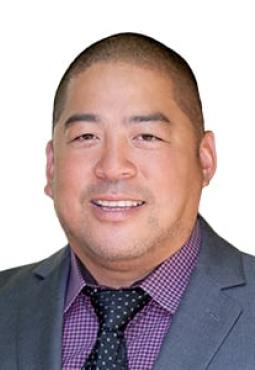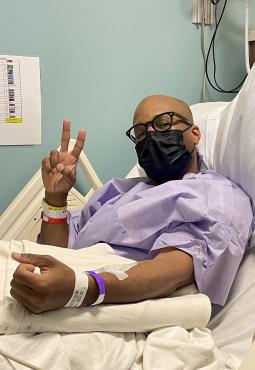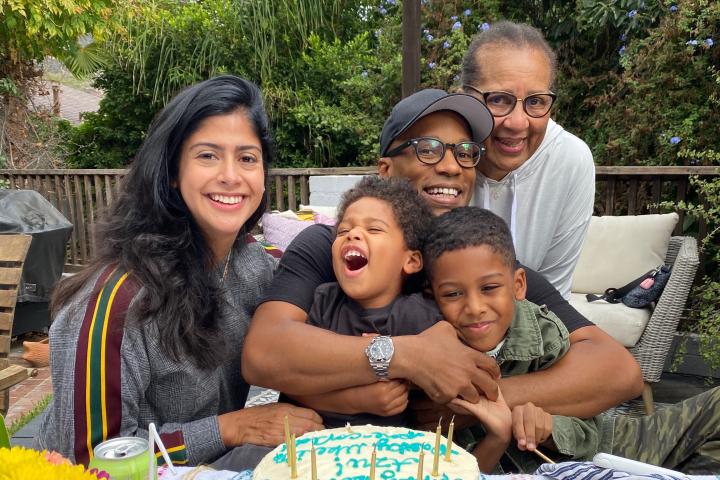Music industry executive Jonathan Azu, 46, grew up in a family of medical professionals with more than their fair share of medical issues.
First Azu’s father, a surgeon who worked with underserved communities in East St. Louis and his native Nigeria, and then his uncle, his father’s brother, battled metastatic prostate cancer. His uncle sadly succumbed to the disease within a year of diagnosis, and while Azu's father ultimately passed of unrelated causes, "there's no doubt that his prostate cancer deteriorated his quality of life and sped up his time on Earth," Azu says.
So when Azu, founder and CEO of talent management and brand consultancy firm Culture Collective, was nearing his mid-40s, his mother, a retired orthopedic radiologic technologist, urged him to get a baseline prostate-specific antigen (PSA) screening, which looks for signs of prostate cancer in the blood.
Although he was just 44, with thoughts of his dad and uncle in mind, Azu listened to his mother. “She basically saved my life,” he says. “Because it did uncover something.”
High PSA levels
Azu’s primary-care physician was initially resistant to run the PSA test due to his young age, but ultimately agreed because of his family history. When the numbers came back “unusually high,” he repeated the test. With numbers well above average for someone his age, Azu received a referral to a urologist.
Azu called his twin sister, a breast cancer surgeon in New York City, for advice. “She immediately said, ‘You need to get over to City of Hope,’” he recalled.
What his sister didn’t know was that Azu had a longtime affiliation with City of Hope as a supporter of its music industry fundraising events and efforts to address health care disparities, which include sitting on the executive board of its Music, Film, Entertainment Industry (MFEI) fundraising group and chairing its annual Closing the Care Gap health care equity events. In its 47-year history, the MFEI group has raised more than $130 million for City of Hope.
“There is nothing I am more passionate about than breaking the barriers that prevent those who look like me from gaining access to screenings and treatment that could save their lives,” Azu, a Billboard Social Impact honoree and two-time 40 Under 40 Power Player who has nurtured the careers of the likes of Anita Baker, Emily King, Cory Henry, Luke James, Leon Thomas and more, told the audience while introducing a City of Hope-sponsored symposium on health care equity held at the GRAMMY Museum in 2022.
“I was a supporter, a contributor, but it’s just different when now you’re on the other side of the fence,” Azu says.
“When I had my first appointment at City of Hope's Duarte campus, it was a very surreal experience. I had to remind myself at one point that I was not there for a tour as an MFEI board member, I'm here for a biopsy!" he laughs.
“But to know that all the things that I learned about and have supported about City of Hope as a music executive were true when I became a patient — that was pretty incredible. The support my family and I received allowed us to all get through this bump in the road."
Low-grade prostate cancer
Azu had his initial consultation with Donald Hannoun, M.D., assistant clinical professor in the Division of Urology and Urologic Oncology, Department of Surgery, who practices at City of Hope’s Santa Clarita and Antelope Valley clinical network locations. A subsequent prostate biopsy by Hannoun uncovered “some concerning hot spots,” but they were low-grade.
“They put me on active surveillance,” Azu explained. "My health care team was not quite ready to make a treatment move yet, but instead wanted to monitor me over the course of the next 12 months."
'All you want to do is make the right decisions, and there's a lot of mental anguish that goes into figuring out what the right decision is.'
Jonathan Azu
That close watch included multiple PSA tests and an MRI (magnetic resonance imaging) scan in February 2023, followed by another biopsy in April 2023.
“I thought in my head that the second biopsy was just more of a formality, and they would say listen, we have a hot spot, but we don't think it's going to be that aggressive,” Azu says.
He remembers sitting in a coffee shop after his follow-up biopsy and seeing a phone notification that there was a message from his doctor waiting on his health care app.
“I opened it up, and I was shocked.”
Undergoing robotic prostatectomy
It wasn’t the news Azu had expected. The message said he needed to come in to discuss treatment options. The second biopsy showed that Azu had a more aggressive form of prostate cancer than originally thought.
Fortunately, it had been caught early. Hannoun referred him to oncologist Steven Rosen, M.D., executive vice president and director emeritus of the comprehensive cancer center and Beckman Research Institute of City of Hope, at the Duarte campus.
That’s when it really kicked in that he had cancer, and “all you want to do is make the right decisions, and there's a lot of mental anguish that goes into figuring out what the right decision is.”

After reviewing his case, Rosen referred Azu to urologic surgeon Clayton S. Lau, M.D., the Pauline & Martin Collins Family Chair in Urology, chief of the Division of Urology and Urologic Oncology and director of the Prostate Cancer Program, who specializes in robotic and minimally invasive urologic surgery, having performed over 3,300 such procedures.
Lau ordered a PSMA PET scan, a new, highly precise type of imaging that can show if prostate cancer has spread outside of the gland, including to surrounding lymph nodes. Thankfully, the scan showed that Azu’s cancer was confined to his prostate.
“We went over the options,” Lau said, noting that they included Azu’s family members in some of their discussions. These were “to continue with active surveillance, which obviously didn’t make sense; radiation; high-intensity frequency ultrasound; or surgery. Knowing he had progression of disease, and given his young age and strong family history, I recommended surgery. It would give him the best chance of a cure, and there is a good chance of recovery from side effects.”
Azu had his wife, Rosa, and two boys, ages 5 and 9, foremost in his mind when he made his treatment choice. “Everyone felt that this would be the approach that would get this thing out of my life forever,” he said. “My boys do not know their grandfather; they do not have a great-uncle. That weighed heavily on me and drove my decision.”

Lau performed a robotic prostatectomy on May 22. Using robotic surgery means there is “less blood loss, a quicker recovery, and I’m able to do a much more meticulous dissection of the nerves and the blood vessels to help minimize side effects,” Lau explained. The procedure took an hour and half, and Azu went home the next day. His margins were negative, meaning he’ll require no chemotherapy or radiation.
Now four months out from surgery, Azu says he is “feeling great.” City of Hope has helped him manage his recovery, which has included minimal side effects. “Being as truthful and as open as possible in your appointments is important,” he says. “You have to be vulnerable” to get help.
“He’s had a really good recovery of function,” Lau said. “He’s back to his normal routine. It’s early, but he’s doing great.”
Azu also underwent genetic screening at City of Hope to find out if he carries any inherited risk factors. None were found. Still, Lau recommends that Azu’s boys start prostate cancer screening when they turn 40 because of their family history.
Encouraging screening
Azu's experience has made him acutely aware of the privileges he had in terms of resources and access to health care. He recognizes that not everyone has the same advantages, and he is committed to paying it forward. In particular, he highlights the barriers faced by people of color.
During his research into his own condition, “I read a study that a lot of people of color choose to go through a radical prostatectomy, even if it's not advised for their stage of cancer. I couldn't understand why somebody would do that. When I looked deeper into it, it was because of the cost of health care and the inability to fund active surveillance and repeat biopsies over the course of their lives.”

“Then on top of that, this is a particular disease that impacts communities of color more in terms of mortality, and a lot of that is due to lack of screening and prevention measures. We must do everything we can to fix this.”
Azu is passionate about the work being done in the Division of Health Equities at City of Hope. He says he plans to continue his work to raise awareness and ensure that more lives are saved by advocating for increased screenings and improved access to care. Azu's personal journey has transformed him from a supporter into an emphatic advocate, driven by a desire to help others who may not be as fortunate as he was.
“I am one of the blessed ones — I remember that every day. I am now dedicated more than ever to assisting the Division of Health Equities at City of Hope in providing more early screening education and better access to health care for people who look like me,” he says.
“My outcome is going to be a lot better because of the screening I was doing. When I got sick, I had access. I want to be able to help people who maybe aren't as lucky as me, and make sure we're saving their lives as well.”
